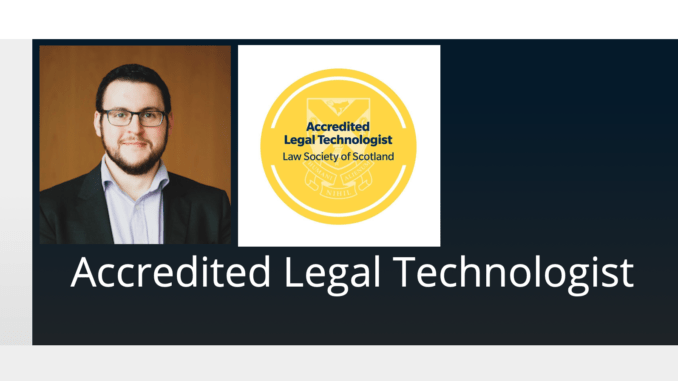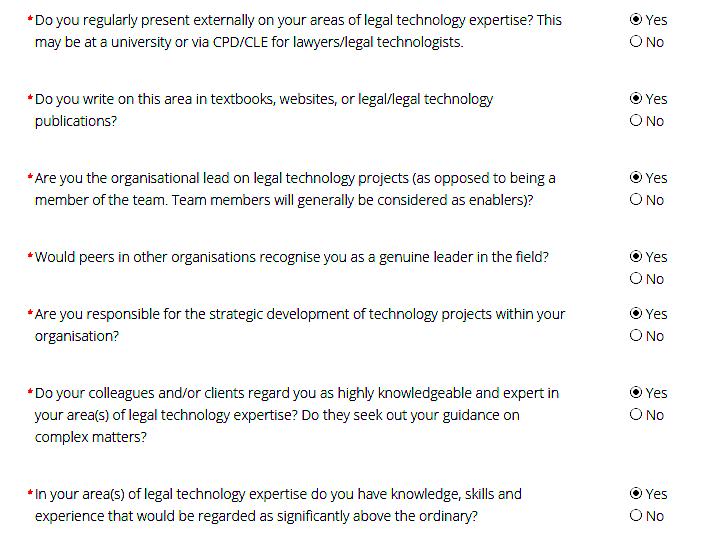
Sam Moore, Innovation Manager at Burness Paull, has become the first ‘Accredited Legal Technologist’, following the launch of the professional standard by the Law Society of Scotland (LSS). The professional award for legal technology expertise also appears to be one of the first examples of a national Bar or Law Society providing such an official accreditation, as opposed to just obliging lawyers to learn about technology.
The President of the Law Society of England & Wales, Simon Davis (see full comment below), told Artificial Lawyer that the organisation would not be following suit at present to offer a similar accreditation.
Moore, who has an advisory board role at the LSS in relation to its LawscotTech group, explained that the Society had been looking at such a move for around three years. The organisation, which represents Scottish solicitors, started by asking what skills are needed to work in the field of legal technology.
‘Legal technologist is not a defined title or regulated role,’ Moore explained. ‘So, they wanted to introduce some standards. They also want Scotland to be a centre of excellence for legal technology.’
‘They hope that the status will help people to go into this area as a career. It’s something that people can now work toward. And it may help to increase the number of people doing this work [in Scotland],’ he said.
In this regard the LSS therefore hopes that the accreditation may actually drive more people into this field because there is now something substantive there in terms of a professional hallmark.
Talking about the process of gaining the title, Moore said that the application process focused on whether you had sufficient experience and could provide proof of it.
There are a series of questions (see below example) and the LSS then decides if you deserve the accreditation. How exactly they measure or benchmark the pass/fail level for this is not known.

Moore noted that you have to pay £100 ($120) per year, and that the accreditation will need to be renewed every three years. I.e. you could potentially lose the accreditation. The official mark of legal tech bona fides is currently only available to lawyers and paralegals registered in Scotland. But, this is likely to be expanded in the near future.

Artificial Lawyer asked the Law Society of England & Wales if they would be offering a similar professional badge, or if they would like to make a comment on Scotland’s move.
Simon Davis, President of the Law Society of England and Wales, said: ‘The LawTech sector in England and Wales is thriving – it has become a key component for the delivery of legal services and in the wider justice system.
‘There are no immediate plans to develop an accreditation scheme like that launched by the Law Society of Scotland. Instead, we will continue to support the LawTech community directly: for example, through our LawTech incubator at Barclays Eagles Lab – with almost 20 residents building solutions for private practice and in-house.
‘We will continue to advise lawtech developers on engaging with solicitors and firms, as we seek to influence government to ensure the resources are available for the LawTech sector to grow.’
To conclude, on a personal level, Moore said that he felt ‘very proud to have done this’. He added that more people were needed in Scotland to come into the field of legal technology and he hoped this new professional awards system would encourage that.
He added: ‘To be the first person to do this is great.’
If you’d also like to get this accreditation – and meet the criteria – then check out the portal here.
—
Below is the official scope of the ‘Accredited Legal Technologist’.
‘Our view is that legal technologists will usually work with other legal professionals to:
- Deliver and present legal advice to clients differently
- Collaborate with clients and other service providers to present legal advice
- Reduce time spent on repetitive, labour intensive tasks
- Reduce overheads and increase profitability
- Improve knowledge management techniques
- Ensure the safety of the data held within the organisation
- This voluntary status aims to create a community of technologists globally who work to drive excellence in the legal technology profession.
We hope that as the status develops over time this will become a quality marque that all working in legal technology will wish to hold as it provides assurance to the public, clients and to the legal profession.
Benefits
- Entitled to call yourself a Law Society of Scotland Accredited Legal Technologist
- A unique, professional status which you can use in emails, on social media, and on business cards
- Accreditation in a defined area of technology expertise
- Specially tailored technologist newsletter
- Exclusive Accredited Legal Technologist events and networking opportunities
- Opportunity to join committees / take part in our mentoring programmes
- The opportunity to work with us to further develop this status over the coming year
- Our long-term ambition is to create levels of accreditation and those who hold the status will play a key role in how that occurs.’
—
What do you think? There are a lot of legal tech education courses that provide certificates and formal qualifications already, but perhaps Law Societies and Bar organisations doing this too is a good way to encourage a wider interest in legal technology as a career path?
2 Trackbacks / Pingbacks
Comments are closed.